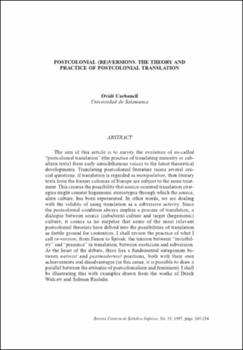Postcolonial (Re)versions. The Theory and Practice of Postcolonial Translation
Author
Carbonell, OvidiDate
1997Abstract
The aim of this article is to survey the evolution of so-called
“postcolonial translation” (the practice of translating minority or subaltern
texts) from early autochthonous voices to the latest theoretical
developments. Translating postcolonial literature raises several crucial
questions: if translation is regarded as manipulation, then literary
texts from the former colonies of Europe are subject to the same treatment.
This creates the possibility that source-oriented translation strategies
might counter hegemonic stereotypes through which the source,
alien culture, has been represented. In other words, we are dealing
with the validity of using translation as a subversive activity. Since
the postcolonial condition always implies a process of translation, a
dialogue between source (subaltern) culture and target (hegemonic)
culture, it comes as no surprise that some of the most relevant
postcolonial theorists have delved into the possibilities of translation
as fertile ground for contention. I shall review the practice of what I
call re-version, from Fanon to Spivak: the tension between “invisibility”
and “presence” in translation, between exoticism and subversion.
At the heart of the debate, there lies a fundamental antagonism between
nativist and postmodernist positions, both with their own
achievements and disadvantages (in this sense, it is possible to draw a
parallel between the attitudes of postcolonialism and feminism). I shall
be illustrating this with examples drawn from the works of Derek
Walcott and Salman Rushdie.





